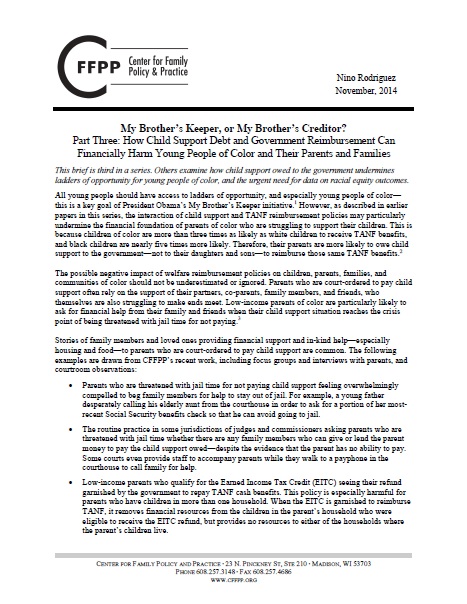My Brother’s Keeper, or My Brother’s Creditor? (Part Three)

Date: November 15, 2014
Author(s): Nino Rodriguez
This brief is third in a series. Others examine how child support owed to the government undermines ladders of opportunity for young people of color, and the urgent need for data on racial equity outcomes.
All young people should have access to ladders of opportunity, and especially young people of color—this is a key goal of President Obama’s My Brother’s Keeper initiative. However, as described in earlier papers in this series, the interaction of child support and TANF reimbursement policies may particularly undermine the financial foundation of parents of color who are struggling to support their children. This is because children of color are more than three times as likely as white children to receive TANF benefits, and black children are nearly five times more likely. Therefore, their parents are more likely to owe child support to the government—not to their daughters and sons—to reimburse those same TANF benefits.
The possible negative impact of welfare reimbursement policies on children, parents, families, and communities of color should not be underestimated or ignored. Parents who are court-ordered to pay child support often rely on the support of their partners, co-parents, family members, and friends, who themselves are also struggling to make ends meet. Low-income parents of color are particularly likely to ask for financial help from their family and friends when their child support situation reaches the crisis point of being threatened with jail time for not paying.
Other RELATED PUBLICATIONS
- FEBRUARY/MARCH 2018 POLICY BRIEFING
- OCTOBER 2017 Policy Briefing
- Child Support Debt in Georgia Frustrates Family Economic Security for Black Parents and Children
- SEPTEMBER 2017 Policy Briefing
- Low-Income and Never-Married Families: Service and support at the intersection of family court and child support agency systems

